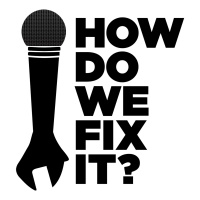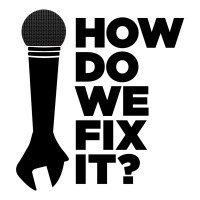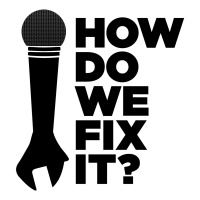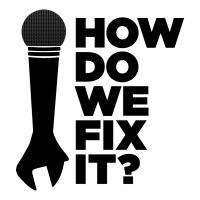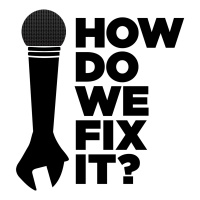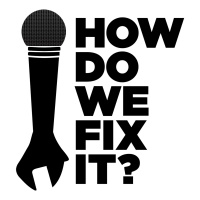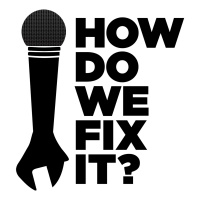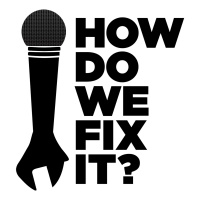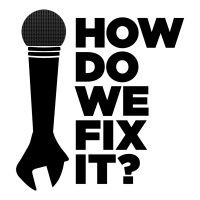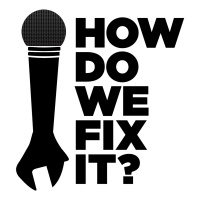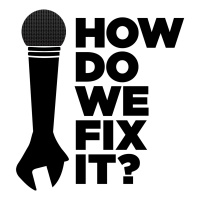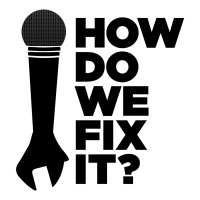How Do We Fix It?
- Autor: Vários
- Narrador: Vários
- Editor: Podcast
- Duración: 182:12:02
- Mas informaciones
Informações:
Sinopsis
From politics to the personal, we're about solutions. Our weekly podcast features two friends and longtime journalists. Join Richard Davies (ABC News) and Jim Meigs (Popular Mechanics) as they challenge authors, experts and provocateurs in a search for positive, practical ideas. Guests include Alan Dershowitz, a noted legal scholar and defender of civil liberties; Mike Rowe of "Dirty Jobs" and Lenore Skenazy, founder of "Free Range Kids." Topics include politics, parenting, personal finance, human behavior and much more. "How Do We Fix It?" - a repair manual for the real world. Produced by DaviesContent
Episodios
-
Fixes for Manufacturing: Krisztina "Z" Holly
16/11/2017 Duración: 22minThis week we dismantle the myth that American manufacturing is in a death spiral. It’s not. Our guest is MIT-trained engineer and tech entrepreneur Krisztina “Z” Holly, host of the podcast, “The Art of Manufacturing."Even as factory jobs have declined, manufacturing growth has surged during the past three decades. Manufacturing production grew 2.9% in October compared to 2016, according to the Federal Reserve. From construction equipment to food products and semiconductors, manufacturers are riding a tide of business optimism.This episode looks at new innovations in manufacturing and how the future could be brighter.In addition to her popular podcast, Z is Founder & Chief Instigator of LA Mayor Garcetti’s "Make it in in LA" manufacturing initiative. See acast.com/privacy for privacy and opt-out information.
-
#128 Solutions for America's Opioid Epidemic: Sam Quinones
08/11/2017 Duración: 26minAmerica’s opioid epidemic is an addiction crisis like no other the country has ever faced. Deaths outnumber car crash fatalities. Since 1999, 200,000 people have died from overdoses related to Oxycontin and other prescription painkillers. The scourge is the result of a terrible double whammy: The relentless marketing of pain pills and the ruthless efficiency of drug pushers from one small Mexican town, who deliver heroin like takeout pizza.Our guest, Sam Quinones, author of the highly praised book "Dreamland: The True Tale of America's Opiate Epidemic," is our guide to this complex tragedy. We look at the roots of the epidemic and possible solutions. From innovative treatment programs in Kentucky jails to drug courts in Buffalo, New York that offer help for addicts, but also demand accountability, there are ways to reduce the immense pain, suffering and damage."This issue allows us to come together as Americans," says Sam. "Every addict cannot go it alone. They need to be surrounded by ser
-
#127 The Threat to Democracy: Reed Galen
02/11/2017 Duración: 27minOne year after the election of Donald Trump, American democracy is under threat. Our civic life is in a shambles.Our guest, Reed Galen, says America is a “dual-civilization society,” with each side viewing the other with suspicion, disgust and disdain.The guardrails of democracy are banged up. Some dents were made years ago — the result of dysfunction In Washington D.C. Others are the result of the President’s sustained attacks on Congress, the judiciary and a free press.In this episode we look at ways to narrow the gap — from non-partisan redistricting commissions and curbs on gerrymandering, to encouraging more independents to run for office.Political strategist Reed Galen was deputy campaign manager for Senator John McCain's Presidential campaign and worked in the George W. Bush White House. Earlier this year, Reed left the Republican Party and is now Chief Strategist at Serve America Movement.He works actively to narrow the great political divide and boost citizen involvement in civic life. See
-
#126 Using Data To Predict the Future: Rebecca Costa
26/10/2017 Duración: 27minCan data be used to prevent mass shootings, dramatically reduce opioid addiction and tell elderly people that they about to fall? Our guest, Rebecca Costa, says it can. In this episode we look at why predictive analytics may be the most profound technological change in the past 15 years-- even more important than smartphones. In her new book, “On The Verge,” and on this podcast, Rebecca says we now have the power to predict the future, adapting in advance to changing conditions. She also tells us about the ideas raised on the popular radio show, “The Costa Report” and in her bestselling book, “The Watchman’s Rattle.” Predictive analytics depend on the ability to collect massive amounts of data, using algorithms to analyze seemingly random bits of information. We explore why all this is coming together now. One example being used by doctors today is predictive healthcare. Rebecca says that foresight and “fore action”will help human beings “assume our rightful place as aspiring Masters of the Universe.
-
#125 The Harvey Weinstein Sex Scandal: What Next? Anne Thompson
18/10/2017 Duración: 27minThe public downfall of film boss, Harvey Weinstein raises deep questions about the culture of Hollywood and its longstanding tolerance of sexual misbehavior by powerful men.Rumors about Weinstein's outrageous behavior had been an open secret in Hollywood for years. But Weinstein, a king of independent film, was able to cow the media, and had the power to break the careers of any women who dared go public with complaints.All that changed recently when a New York Times investigation uncovered dozens of allegations that Weinstein had engaged in rampant sexual harassment. A deeply reported article in The New Yorker included additional accounts of coercive behavior and sexual assaults on the part of the studio chief.Anne Thompson, Editor-at-Large for the movie-news site, Indiewire, is our guest. Anne is a veteran entertainment journalist who has worked for the Hollywood Reporter, Variety, and Entertainment Weekly. She's the author of the book, "The $11 Billion Year: From Sundance to The Oscars."This episode l
-
#124 Russia's Threat to U.S. Democracy: Amy Knight
11/10/2017 Duración: 29minHow should the U.S. and other Western nations deal with Vladimir Putin and well-documented threats to democracy from the Russian government? What are the most effective ways to push back against hacking and other attacks?Ever since Vladimir Putin came to power, his critics have turned up dead on a regular basis. According to our guest, Amy Knight, this is no coincidence. In her book "Orders to Kill" and during this episode of "How Do We Fix It?", she exposes a campaign of political murder during Putin's reign that includes terrorist attacks such as the Boston Marathon bombing in 2013. Called "the West's foremost scholar of the KGB” by The New York Times, Amy Knight traces Putin's journey from the Federal Security Service (FSB) in the late 1990's to his rise to absolute power in the Kremlin. In this episode, we also explore President Trump's defense of Putin and his denial that the Russian leader has murdered opponents. Amy Knight explains why human rights groups in The West and Putin's brave an
-
#123 Affirmative Action for Conservatives? Michael Roth
04/10/2017 Duración: 28minAre free speech rights threatened at universities? Is Attorney General Jeff Sessions correct when he says political correctness has run amok on college campuses?Conservatives point to the angry scenes at Middlebury College, where Charles Murray was shouted down, and demonstrations at University of California, Berkeley, which led to the cancelation of Free Speech Week, as alarming examples of intolerance. Liberals push back, saying that protests against neo-Nazis, racism, and those who denigrate other cultures are part of a proud tradition of resistance to hate.In this episode, Richard speaks with Wesleyan University President, Michael Roth, who wrote a recent article for the Wall Street Journal: "The Opening of the Liberal Mind:Affirmative action for the study of conservative ideas."Professor Roth makes a powerful argument in defense of free speech, especially for unpopular views. In the days after controversy erupted over President Trump's scathing criticism of NFL player protests during the natio
-
#122 Title IX and Sexual Assault: Jeannie Suk Gersen
27/09/2017 Duración: 24minDays ago, Education Secretary Betsy DeVos scrapped Obama-era Title IX rules on campus sexual assault, plunging herself into a furious controversy. This episode goes beyond name-calling and looks at how colleges and universities could improve their policies."This harmful step in the wrong direction may cause survivors of sexual assault to go back into the shadows, Democratic Senator Patty Murray said of the DeVos guidance. The co-founder of the group, End Rape on Campus, Sofie Karasek, went further, claiming the aim of the new policy was “to protect those who ‘grab’ by the genitals and brag about it”. But Harvard Law Professor, Jeannie Suk Gersen, a longtime critic of the Obama Administration's 2011 letter to colleges and universities, wrote in NewYorker.com that if the DeVos statements "were made by a different official in a different Administration, they would seem rational, uncontroversial, and even banal."In this episode of "How Do We Fix It?," we discuss arguments over "rape culture" on college campu
-
#121 Why We Need Stories and Myths: Stephen Greenblatt
20/09/2017 Duración: 20minLove him or loathe him, Donald Trump told a more compelling story about himself than his opponents. The 2016 election was, for his critics, a jarring reminder of the limits of limiting political rhetoric to detailed policies and programs.In this episode of "How Do We Fix It?", we explore the power of myths and legends: Why they are essential in making sense of life.Harvard Humanities professor Stephen Greenblatt is our guest.Using the origin story in the Bible, we discuss the enormous power of foundation stories to explain human fears, desires and morality. At their best the myths and legends we share with each other can bring our communities together in loyalty, love and solidarity. But at their worst they can lead us to believe in dangerous fantasies, setting off one group of people against "the other." See acast.com/privacy for privacy and opt-out information.
-
#120 From Political Disgust to Action: Eric Liu
13/09/2017 Duración: 23minSo many of us are furious at President Trump, Congress, EPA Administrator Scott Pruitt, The Democrats or the news media-- name your poison. Two thirds of Americans say they are dissatisfied with how things are going in this country today, compared with fewer than three-in-ten who are satisfied. This is a dramatic change from the 1990's, when most people had a positive view of national conditions. This show is an empowering response to anger and disgust. Eric Liu, founder and CEO of Citizen University, says that you're more powerful than you think. We discuss the stories, strategies and ideas raised in his timely book, "You're More Powerful Than You Think: A Citizen’s Guide to Making Change Happen" The key to fighting back successfully is to have a strategy and know how to read and write power,” but most people have no understanding of power and how to use it. “I think the reality of American life, right now, is that so many people have neither the motivation nor the ability to read or write power,” Eri
-
#119 A Conservative Cure for Climate Change: Bob Inglis
07/09/2017 Duración: 26minClimate scientists warn that Hurricanes Irma and Harvey are examples of extreme weather that will become much more common in the years to come. But Trump Administration officials ridicule any link between this month's devastating storms and global warming. Without a change of heart, most conservatives will continue to resist an overwhelming body of scientific evidence on climate change. Congress will fail to pass needed reforms. Enter former GOP Congressman Bob Inglis. He argues that while Republicans are part of the problem, they must be part of any solution. This small-government Christian conservative from South Carolina believes in a free-market answer to climate change. He supports a revenue-neutral carbon tax, combined with a cut in FICA - the fee paid by workers to pay for Social Security and Medicare. "Until we hear the information from somebody we care about, it's hard for us to change our minds," says Inglis, who argues that respect rather than ridicule is the best way to win new converts. "If
-
#118 After Harvey: Climate Change Insurance. Gernot Wagner
30/08/2017 Duración: 21minIs climate change to blame for Hurricane Harvey and the devastating floods around Houston? Even though we can't be certain about the cause of a single storm, Harvey's epic rainfall and surprisingly long duration remind us of the need for urgent action.In this edition of our solutions podcast, economist Gernot Wagner, executive director of Harvard University's Solar Geoengineeering Research Program, makes the case for market-based climate insurance: A fix that even skeptical conservatives could love.If there was a 10% chance of a tree falling on your house, you'd buy home insurance. Gernot says that's what the U.S. and every other nation must do to reduce global warming. His fix for the planet? Carbon pricing through a program of cap-and-trade that lets the market find the cheapest way to cut greenhouse gas emissions. Companies that exceed their emissions cap pay a penalty. Energy-efficient firms make money by selling their pollution allowances. Cap-and-trade can boost growth and jobs. California has desi
-
#117 Is Hiking a Cure for PTSD? Sean Gobin
23/08/2017 Duración: 37minCan vets walk off the devastating impacts of PTSD? Do long-distance hiking, biking and river paddling journeys offer far better treatment for the emotional and psychological damage of war than pills or therapy offered by the VA? Sean Gobin is a United States Marine Corps veteran who served 12 years as an Infantry Rifleman and Armor Officer. He tells us his own personal story. After returning home from several deployments to Iraq and Afghanistan, Sean hiked the 2,181-mile Appalachian Trail. In 2013, he founded Warrior Expeditions and now serves as the Chief Executive Officer.Since 2013, Warrior Expeditions has provided veterans with everything they need to complete a three to six month-long outdoor expedition at no cost. Their journeys offer them the opportunity to decompress from military service and come to terms with wartime experiences.Participants have reported significant improvements in physical, mental, and social well-being during and after their journeys.Warrior Expeditions outfits veterans
-
#116 The Case for Passion in Our Lives
17/08/2017 Duración: 22minNeil deGrasse Tyson became passionate about astrophysics when he was a teenager. Best-selling science journalist Mary Roach is well-known for her humor and curiosity as she explores the science of keeping human beings intact, sane and awake during the extreme circumstances of war.This "Fix It" episode is about passion and is inspired by our many guests. They bring their wisdom, emotion and enthusiasm with them as they describe what turns them on about their work and expertise. Obstetrician-gynocologist Rose Gowen, born and raised in Brownsville, Texas, speaks about her mission to get her small city with a large obesity problem to exercise more and eat better food. "Pretty much all of my father's side of our family has diabetes," she says. Emily Esfahani Smith's passion for learning from strangers prompted her to write the book "The Power of Meaning: Crafting a Life That Matters. She talks about the roots of her discoveries.Author, investment expert and asset manager Karen Firestone has spe
-
#115 Refugees Are Just Like You: Ahmed Badr
09/08/2017 Duración: 28minFar too often refugees are thought of as "the other"-- a mass of people who are victims of war, persecution or natural disasters. President Trump has added to the problem, making negative, harsh comments about immigrants. This episode with 19 year-old Iraqi-American refugee Ahmed Badr, looks at how to fix the way we view refugees and migrants. We look at their personal stories and what they bring to enrich the lives of the communities where they now live. Through writing about his own life, Ahmed, now a student at Wesleyan University, realized that his blog helped others see him in a more personal light. Today, he is empowering others to do the same. His art and poetry site, Narratio, is a growing platform where young people from around the world use creative expression to share their unique experiences. Ahmed is also the host of "Together", a soon-to-be released podcast about refugees and migrants. "I've learned other people tell their story versus just telling my own," says Ahmed. "A global citizen is so
-
#114 Grunt: The Science of Humans at War - Mary Roach
03/08/2017 Duración: 30minWhen do fashion designers make the difference between comfort and misery for active soldiers? Why does the military need a radically different kind of crash test dummy? What role could maggots play in healing open wounds? These questions and more are answered by best-selling science journalist, Mary Roach, author of "Grunt: The Curious Science of Humans at War." In this audio tour of duty we go beyond war's battlefields, bombs and bands of brothers to hear why scientists, doctors, researchers and designers do vital work tackling the armed force's most persistent adversaries: heat, disease, exhaustion and noise.The heroes Mary Roach writes about do their work quietly behind-the-scenes, improving the odds that troops who go to war come back alive.Mary has been called "America's funniest science writer" by the Washington Post. In the words of a British reviewer, she "has specialized in tackling the uncomfortable, and at the heart of every book is her desire to explore the places from which we recoil."
-
#113 America's Male Unemployment Crisis: Ed Glaeser
26/07/2017 Duración: 28minHere's a paradox. While the U.S. unemployment rate is near a 16-year low, the percentage of all American adults in the workforce remains stuck at well below pre-recession levels. Men are much more likely than women to drop out of work. In the 1960's 95% of adult men between 25 and 54 were employed. Today, after 7 years of an improving job market, only 80% are in the workforce. People who don't look for a job are not counted in the official unemployment statistics compiled by the Labor Department. Harvard University Professor Edward Glaeser says "there's a war on work." Taxation, housing, regulatory and social policies aimed at improving the lives of low income Americans, he says, often remove incentives for people to get a job. We based our episode on the findings and solutions suggested in Ed's article for City Journal-- "The War on Work and How to End It." See acast.com/privacy for privacy and opt-out information.
-
#13 Fix It Shorts: Why Fixing Health Care Is So Hard
19/07/2017 Duración: 14min"It's back to square one" says the Wall Street Journal after the collapse of Republican proposals to repeal and replace The Affordable Care Act. President Trump says his plan is to "let Obamacare fail." This episode looks at how any reform of America's healthcare system - whether by Republicans or Democrats - is so difficult. Whether it's controlling costs, rationing care or extending coverage to all, there are no easy answers. Today, the future of healthcare is uncertain and coverage for many millions of people hangs in the balance. Our guest, Megan McArdle, a columnist at Bloomberg View explains why The Affordable Care Act is flawed and that many consumers have misconceptions about the true costs of health insurance. "What people are doing is they're gaming the system," she says about those who have moved in and out of healthcare marketplaces. When an illness or medical emergency strikes, many people without employer-based health coverage are "signing up for a few months, using a ton of services and the
-
#12 Fix It Shorts: The Case for Going Outdoors
12/07/2017 Duración: 11minGoing outdoors and taking on new challenges makes you healthier, happier and smarter. Spending time in nature away from cities and suburbs can also bring spiritual and emotional benefits. Co-host Jim Meigs tells us why he's a big outdoor guy, who loves to hike, bike and head for the hills. In this episode we look at ways to add adventure to your life and embrace the excitement of leaving your comfort zone. Kio Stark, author of "When Strangers Meet: How People You Don't Know Can Transform You," explains why meeting people you don't know can have genuine emotional benefits. Even brief chance encounters, she says, can make a difference to how you view the world. We also discuss cycling in cities with Nicole Gelinas of The Manhattan Institute. She tells us about ways to improve urban safety for bikers, pedestrians and motorists. See acast.com/privacy for privacy and opt-out information.
-
#11 Fix It Shorts: Is Summer Fun Under Assault? Lenore Skenazy
05/07/2017 Duración: 12minLenore Skenazy of Free Range Kids makes the case for carefree summer activities and unstructured play time-- arguing against those who put safety fears ahead of a child's need to explore, be curious and grow. "If You're a Kid, the Experts Want You to Have a Fun-Free Summer" is the title of a recent article by Lenore. Summer is a time to "dig in the sand, gulp from the hose, play at the park, and leap with joy," writes Lenore. "Unless you're a kid-- in which case, find yourself a comfy sofa in a dark, quiet room and settle in." Parents are bombarded with safety messages from the American Academy of Pediatrics, Parenting Magazine and other well-intentioned sites, which give urgent warnings about the hazards of summer. Their advice, says Lenore, is "don't have fun, it's too dangerous." Find out why being safety obsessed comes at a heavy price. Worried parents risk robbing their children of curiosity about the world and pride in their own achievements. See acast.com/privacy for privacy and opt-out


